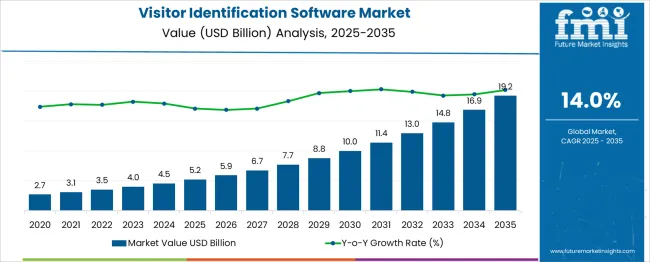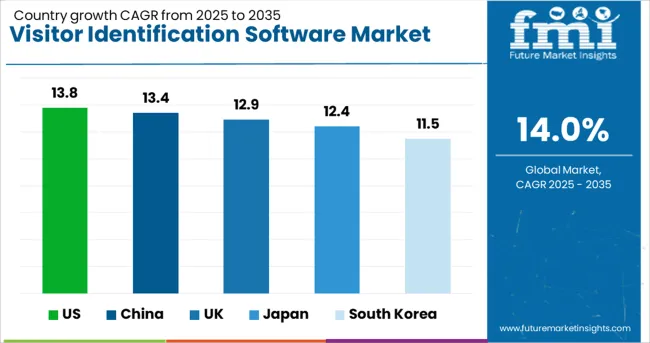The Visitor Identification Software Market is estimated to be valued at USD 5.2 billion in 2025 and is projected to reach USD 19.2 billion by 2035, registering a compound annual growth rate (CAGR) of 14.0% over the forecast period.

| Metric | Value |
|---|---|
| Visitor Identification Software Market Estimated Value in (2025 E) | USD 5.2 billion |
| Visitor Identification Software Market Forecast Value in (2035 F) | USD 19.2 billion |
| Forecast CAGR (2025 to 2035) | 14.0% |
The importance of tracking visitor movements through numerous organizations is a key element driving the global visitor identification software market to develop.
Visitor identification software is a software-based tool that collects, tracks, documents, and recovers visitor information to manage visitor activities inside the office/building. Market firms are increasingly employing organic and inorganic growth tactics to remain competitive in the changing visitor identification software market outlook.
The end-user industries of visitor identification software are continuously contributing to the dynamic environment and growth of the visitor identification software market share. These industries - mainly BFSI, IT & Telecom, Consumer Durables & Electronics, Travel & Hospitality, and Automotive are expanding their reach globally.
The industries are encouraging the adoption of visitor identification software to enable the calculation of visitors through the website at a higher accuracy rate.
The visitor's identification software records all the data related to the visitor and provides security digitally, which lifts the demand for visitor identification software. To identify and manage visitors with accuracy, marketers are adopting visitor identification software in the organization.
Based on the organization size, the visitor identification software market is divided into large enterprises and small and medium enterprises.
The large enterprise organization size in the visitor identification software market is expected to lead the market. The large organization segment is projected to rise at a high CAGR of 13.5% during the forecast period. The growth rate of this segment in the pre-covid period was even higher at 17.2% through 2035.
While the large enterprises are leading the growth in the demand for visitor identification software market, the small and medium enterprises are helping in the development of new visitor identification software markets on a regional level.
As per the pricing model, the visitor identification software market is segmented into fixed pricing and variable pricing models.
The fixed pricing model is leading the sales of visitor identification software with a growth rate of 13.5% through the forecast period of 2025 to 2035. The segment was growing at an even higher pace in the past, with a tremendous growth rate of 17.2%.
This trend is likely to continue in future periods, with the fixed pricing model leading the growth in the visitor identification software market.

| Regions | CAGR (2025 to 2035) |
|---|---|
| US Market | 13.8% |
| UK Market | 12.9% |
| China Market | 13.4% |
| Japan Market | 12.4% |
| South Korea Market | 11.5% |
Demand for visitor identification software is expected to rise in the North American region during the forecast period. In the region, the US is expected to be the dominant country leading the adoption of visitor identification software. The US visitor identification software market is expected to grow with a CAGR of 13.8% during the forecast period 2025-2035.
The key drivers of the visitor identification software market growth are the continuous adoption of new technology, privacy, and automation trends in the industry. This has also led to the development of a positive visitor identification software market outlook for the future.
The China market is anticipated to hold the second position in the visitor identification market share due to an increase in demand for visitor identification software. This regional visitor identification software market is anticipated to rise with a CAGR of 13.4% during the forecast period 2025-2035.
Additionally, UK and Japan visitor identification software markets are anticipated to grow rapidly during the forecast period as the visitor identification software market trends indicate a rise in the generation of leads on websites through visitors. The UK visitor identification software market is projected to grow at a CAGR of 12.9% through the forecast period.
There are several key competitors in the visitor identification software market who are focusing on the growth by expanding their opportunities in the industry.
Therefore, the key players are using various types of technology, process and strategy in the growth of their visitor identification software market share. Some of the key strategies are collaboration, merges, partners, for expanding the visitor identification market share during the forecast period.
Moreover, the Companies are considering to implement a portfolio-synergistic strategy to enable a more comprehensive and inclusive growth of their visitor identification software market share.
Recent Development in the Visitor Identification Software Market are:
The key players in the visitor identification software market are Proxyclick, Jolly Technology, HID Global, Visitly, Envoy, Honeywell, SmartSpace Software, MRI Software, Vizmo, VersionX, InVentry, Carson Living, Heptagon Technologies, Genetec, piLOBI, AlertEnterprise, Parabit Systems, Traction Guest, Wellcome.me and Others.
The global visitor identification software market is estimated to be valued at USD 5.2 billion in 2025.
The market size for the visitor identification software market is projected to reach USD 19.2 billion by 2035.
The visitor identification software market is expected to grow at a 14.0% CAGR between 2025 and 2035.
The key product types in visitor identification software market are small and medium enterprise and large enterprise.
In terms of pricing model, fixed pricing segment to command 63.4% share in the visitor identification software market in 2025.






Our Research Products

The "Full Research Suite" delivers actionable market intel, deep dives on markets or technologies, so clients act faster, cut risk, and unlock growth.

The Leaderboard benchmarks and ranks top vendors, classifying them as Established Leaders, Leading Challengers, or Disruptors & Challengers.

Locates where complements amplify value and substitutes erode it, forecasting net impact by horizon

We deliver granular, decision-grade intel: market sizing, 5-year forecasts, pricing, adoption, usage, revenue, and operational KPIs—plus competitor tracking, regulation, and value chains—across 60 countries broadly.

Spot the shifts before they hit your P&L. We track inflection points, adoption curves, pricing moves, and ecosystem plays to show where demand is heading, why it is changing, and what to do next across high-growth markets and disruptive tech

Real-time reads of user behavior. We track shifting priorities, perceptions of today’s and next-gen services, and provider experience, then pace how fast tech moves from trial to adoption, blending buyer, consumer, and channel inputs with social signals (#WhySwitch, #UX).

Partner with our analyst team to build a custom report designed around your business priorities. From analysing market trends to assessing competitors or crafting bespoke datasets, we tailor insights to your needs.
Supplier Intelligence
Discovery & Profiling
Capacity & Footprint
Performance & Risk
Compliance & Governance
Commercial Readiness
Who Supplies Whom
Scorecards & Shortlists
Playbooks & Docs
Category Intelligence
Definition & Scope
Demand & Use Cases
Cost Drivers
Market Structure
Supply Chain Map
Trade & Policy
Operating Norms
Deliverables
Buyer Intelligence
Account Basics
Spend & Scope
Procurement Model
Vendor Requirements
Terms & Policies
Entry Strategy
Pain Points & Triggers
Outputs
Pricing Analysis
Benchmarks
Trends
Should-Cost
Indexation
Landed Cost
Commercial Terms
Deliverables
Brand Analysis
Positioning & Value Prop
Share & Presence
Customer Evidence
Go-to-Market
Digital & Reputation
Compliance & Trust
KPIs & Gaps
Outputs
Full Research Suite comprises of:
Market outlook & trends analysis
Interviews & case studies
Strategic recommendations
Vendor profiles & capabilities analysis
5-year forecasts
8 regions and 60+ country-level data splits
Market segment data splits
12 months of continuous data updates
DELIVERED AS:
PDF EXCEL ONLINE
Visitor Management System Market Analysis – Size, Share & Forecast 2025 to 2035
Korea Visitor Management System Market Growth – Trends & Forecast 2025 to 2035
Japan Visitor Management System Market Growth - Trends & Forecast 2025 to 2035
Visitor Management System Industry Analysis in Western Europe - Market Outlook 2025 to 2035
Human Identification Market Size and Share Forecast Outlook 2025 to 2035
Newborn Identification Tag Market Size and Share Forecast Outlook 2025 to 2035
Patient Identification Wristbands Market Analysis – Size, Trends & Forecast 2025 to 2035
Automatic Identification and Data Capture Market Size and Share Forecast Outlook 2025 to 2035
Automatic Identification System Market Analysis by Category, Application, and Region through 2035
Microbial Identification Market Report – Growth & Forecast 2025-2035
Radio Frequency Identification Market Size and Share Forecast Outlook 2025 to 2035
Positive Patient Identification Market Size and Share Forecast Outlook 2025 to 2035
Biometric Driver Identification System Market Growth - Trends & Forecast 2025 to 2035
Automated Fingerprint Identification System (AFIS) Market Size and Share Forecast Outlook 2025 to 2035
Printed Chipless RFID Radio Frequency Identification Market Size and Share Forecast Outlook 2025 to 2035
Software-Defined Wide Area Network Market Size and Share Forecast Outlook 2025 to 2035
Software Defined Vehicle Market Size and Share Forecast Outlook 2025 to 2035
Software Defined Networking (SDN) And Network Function Virtualization (NFV) Market Size and Share Forecast Outlook 2025 to 2035
Software Defined Perimeter (SDP) Market Size and Share Forecast Outlook 2025 to 2035
Software-Defined Wide Area Network SD-WAN Market Size and Share Forecast Outlook 2025 to 2035

Thank you!
You will receive an email from our Business Development Manager. Please be sure to check your SPAM/JUNK folder too.
Chat With
MaRIA